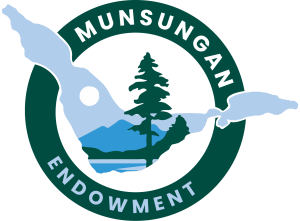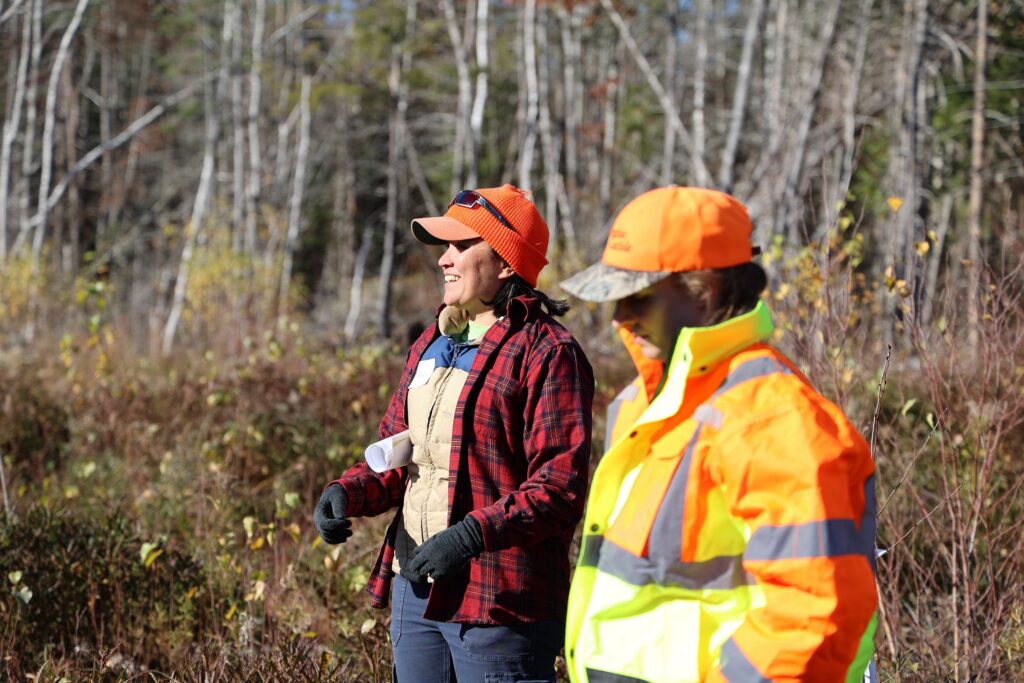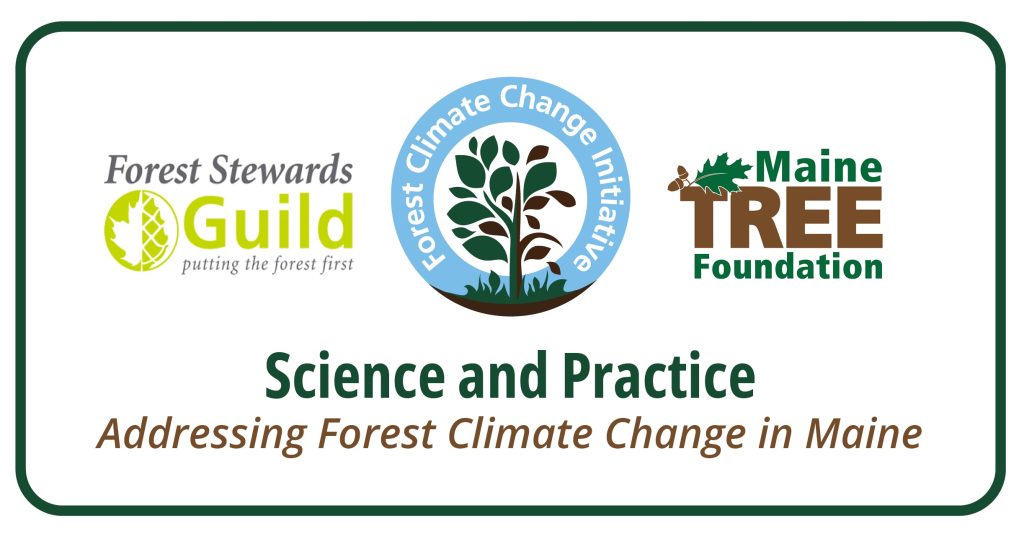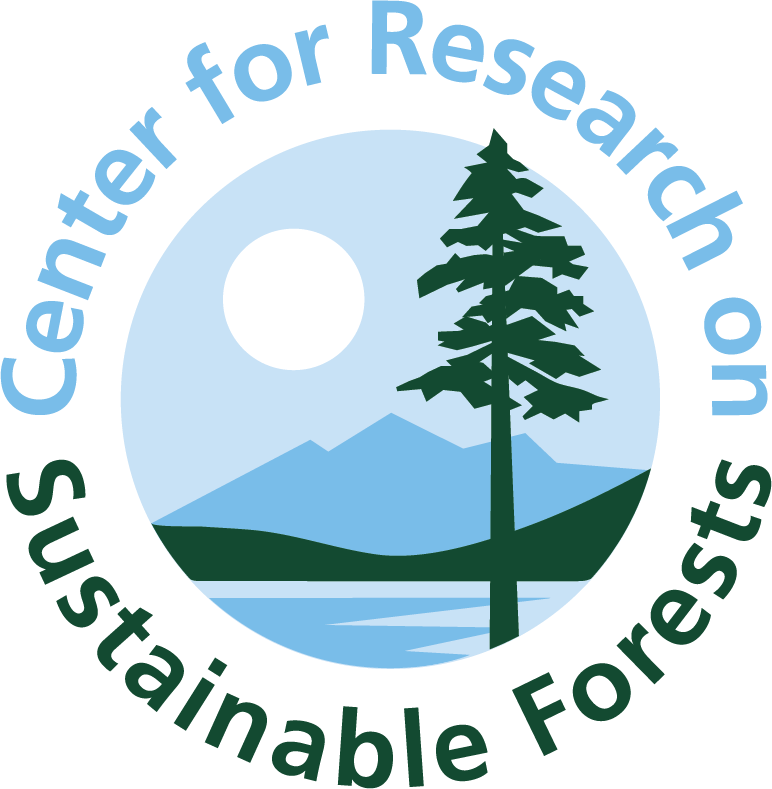Maine Forest Climate Change Webinar & Field Tour Series
Science and Practice: Addressing Forest Climate Change in Maine
An Interactive Webinar & Field Tour Series for Stakeholders and the Interested Public
Check out our Forest Climate Questions and Answers HERE.
Year 4 of the Webinar & Field Tour Series has now concluded
Visit the CRSF YouTube Channel to access the series webinar recordings.
Year 4: Adaptation & Implementation
Join us as we dig into forest health concerns due to climate impacts at new sites around the state. Our panelists will address management & restoration efforts, relevance of long-term research, fire as a tool, biohabitat concerns, forest health threats, and unique adaptation strategies at each site. Noontime webinars are free (registration required); field tour registration includes lunch, snacks, and van transport.
Session 1: Burning as a Management Tool
Nov 1, 2023 Webinar, Noon-1pm (1 Cat 1 CFE)
Nov 3, 2023 Field Tour, 9am – 1:30pm (4.5 Cat 1 CFE)
Location: Waterboro Barrens Preserve, owned and managed by The Nature Conservancy. 25 miles southwest of Portland, this serene woodland preserve is home to the state’s superb example of a boreal pine barrens, a forest biohabitat adapted to thrive after periodic fires.
Discussion: Prescribed burning as a management and restoration tool for pitch pine & scrub oak at Waterboro Barrens Preserve. Panelists Jon Bailey, The Nature Conservancy; Kevin Dodds, USFS; Maine Forest Service.
Resources
-
-
- Maine Prescribed Fire Council
- Areas of Statewide Ecological Significance
- 2022 NAFSE virtual workshop materials for Managing Pitch Pine Under the Threat of Southern Pine Beetle: https://www.firesciencenorthatlantic.org/post/managing-pitch-pine-under-the-threat-of-southern-pine-beetle
- NAFSE SPB working group recording: https://www.firesciencenorthatlantic.org/post/webinar-nafse-southern-pine-beetle-working-group-virtual-meeting
- NAFSE webinar featuring UVM graduate Sonya Kaufman sharing her research on SPB and fire, including study sites at Waterboro Barrens: https://www.firesciencenorthatlantic.org/post/webinar-forest-health-in-the-ossipee-waterboro-pine-barrens-preparing-for-southern-pine-beetle
-
Session 2: Long-term Watershed Research
Dec 6, 2023 Webinar, Noon-1pm (1 Cat 1 CFE)
Dec 8, 2023 Field Tour, 9am – 1:30pm (4.5 Cat 1 CFE)
Location: Bear Brook Watershed (Lead Mtn, nr Beddington). Site is part of long-term research to determine the effects of acid deposition on surface waters and their related watersheds. BBWM program of research encompasses an array of scientific objectives that include acid deposition, climate change and carbon sequestration, nitrogen saturation, base cation depletion, and studies of the evolution of watershed biogeochemistry under prolonged experimental acidification.
Discussion: Mike Howie, American Forest Management, Ivan Fernandez, University of Maine Professor of Soil Science, and Jake Metzler, Forest Society of Maine. Topics will cover the intersection of science, recovery and climate at a long-term research site, the historical and current research at the site, uncut v. managed forests, and the role of conservation efforts. Michael Jensen from the Maine Forest Service will join the field tour.
Session 3: Pests & Pathogens
Mar 6, 2024 Webinar, Noon-1pm
Mar 8, 2024 Field Tour, 9am – 1:30pm
Location: Great Pond Mountain Conservation Trust, East Orland. 5,000 acres of mountains, woods, and water managed for wildlife habitat, sustainable forestry, and community trails. 2023 Maine Outstanding Tree Farmer Award.
Discussion: Restoration and sustainable forestry at GPMCT with Roger Greene, forest consultant to GPMCT. Discussions will cover beech management, forest defoliators, and disease threats in the Acadia region.
Session 4: Women’s Approach to Climate Adaptation
May 8, 2024 Webinar, Noon-1pm
May 10, 2024 Field Tour, 9:30am – 1:30pm
Location: Williamsburg Forest (nr Brownville), owned and operated by Piscataquis County Soil & Water District. Williamsburg Forest, formally Demonstration Forest, is located on 180 acres in Williamsburg Township. The forest offers hiking, bird watching, hunting, snow shoeing and cross-country ski trails for year round enjoyment.
Discussion: Executive Director Sarah Robinson will lead a discussion on foresty, climate and research from the perspective of women practitioners (landowners, consulting foresters, logging contractors, researchers, and policy experts) with Molly London, licensed professional forester; Jessica Leahy, Henry W. Saunders Distinguished Professor of Forestry in the School of Forest Resources at the University of Maine; Julie Davenport, Maine Forest Service District Forester working with loggers and landowners in western Maine.
 The FCCI-FSG webinars and field tours are generously supported by the Munsungan Endowment Fund supporting outreach and education projects that educate the public about forest resources in Maine.
The FCCI-FSG webinars and field tours are generously supported by the Munsungan Endowment Fund supporting outreach and education projects that educate the public about forest resources in Maine.
Click on the session links below for access to webinar recordings, field tour notes, and related resources.
Year 3 (2022-23) Webinar and Field Tour Series
In Year 3 of our forest climate change in Maine webinar/field tour series, our panelists addressed an array of concerns related to Maine’s forests: scope & scale of climate issues; active management strategies; wildlife/bio-habitat concerns; unique adaptation strategies at each site. Click on the topics for resources, webinar recordings, and more.
AMC Research Forests: May 10 & 12, 2023
Climate & carbon friendly management on late successional species, habitat restoration, snow load research & monitoring in the Appalachian Mountain Club’s Pleasant River Headwaters forestlands
Caring for Maine’s Brown Ash Resource in the Face of Emerald Ash Borer, March 1 & 3, 2023
Species preservation goals in the face of EAB and climate change
Howland Research Forest (Howland, ME), October 26 & 28, 2022
Long-term carbon & methane flux, soil data, NASA research
Massabesic Experimental Forest (Alfred, ME), Dec 14, 2022, Jan 13, 2023
Forest ecology, management research and field demonstration
Year 2 (2021-22) Webinar and Field Tour Series
Building on the success of our 2020 Science and Practice Forum and 2020-2021 Science & Practice Webinar Series, FCCI and FSG developed a followup series for 2021-22 that focused on climate change impacts on the different forest types found in Maine through a combination of 1-hour webinars paired with half day field tours. The webinars provided an overview of the topics and issues faced at each site: including those related to the intersection of climate adaptation and site-specific biodiversity. Webinars allowed time for Q&A and to showcase field tour specifics. The field tours examined climate impacts and management at each site.
the success of our 2020 Science and Practice Forum and 2020-2021 Science & Practice Webinar Series, FCCI and FSG developed a followup series for 2021-22 that focused on climate change impacts on the different forest types found in Maine through a combination of 1-hour webinars paired with half day field tours. The webinars provided an overview of the topics and issues faced at each site: including those related to the intersection of climate adaptation and site-specific biodiversity. Webinars allowed time for Q&A and to showcase field tour specifics. The field tours examined climate impacts and management at each site.
Field Site Information
| Site | Hosts | Background |
| Mixed Hardwood Rangeley April 27, 29 2022 |
Rangeley Lakes Heritage Trust, New England Forestry Foundation | Rangeley Lakes Heritage Trust has conserved 14,000 acres of land including 50 miles of lake and river frontage, 15 islands and the majestic 2,443 foot Bald Mountain, all in the Rangeley Lakes Region. This diverse yet ecologically distinct region encompasses many different landowners, which have worked directly with Rangeley Lakes Heritage Trust. More information is available here |
| Coastal Spruce-Fir Schoodic Peninsula Feb. 23, 24 2022 |
Nicholas Fisichelli (Schoodic), Peter Nelson (Schoodic) | The Schoodic Institute in Winter Harbor, Maine is involved with ongoing research in Acadia National Park where changes related to warming temperatures, changing precipitation patterns, habitat fragmentation, and invasive plants, pests, and diseases are being documented. More information about Schoodic is here. |
| Oak-Pine Holt Research Forest Dec 1, 3 2021 |
Jack Witham (UMaine), Kelly French (Maine TREE) | The Holt Research Forest (HRF) in Arrowsic, Maine is the site of long-term ecosystem research on property owned by Maine TREE Foundation. Four decades of data have been collected at this site and ecosystem response following an experimental harvest is now underway. More information on the HRF is available here. |
| Spruce-Fir Penobscot Experimental Forest Oct 27, 29 2021 |
Laura Kenefic (USFS), Keith Kanoti (UMaine), Alessio Mortelliti (UMaine), Kenny Fergusson (MFS) |
The Penobscot Experimental Forest (PEF) in Bradley, Maine is a site of a long-term silvicultural experiment and additional research jointly managed by the US Forest Service and University of Maine. More information on the PEF is available here. |
Year 1 Series: Oct 2020-June 2021
Final Webinar of the Series was held June 2, 2021
The Forest Climate Change Initiative and Forest Stewards Guild invited scientists, researchers, and interested public each month as a panel of researchers, scientists, and stakeholders tackled issues of climate change and how it is influencing Maine’s forests and forest economy. Topics have ranged from impacts on forest health, recreational use, forest management, biodiversity and pests, as well as the role of carbon and greenhouse gases. The series began in October 2020, and ran on the first Wednesday of each month from 12-1pm. Each hour-long session includes an informal presentation, followed by panel discussion and Q&A.
Visit our FAQ page
Click on the MTG PAGE links below for recordings of previously held webinars as well as resources relevant to the topic.
| Date (all 12-1pm) | Focus | Panelists |
| 2020-21 Webinar SERIES | ||
| June 2, 2021MTG PAGE | BONUS WEBINAR: Managing Brown Ash for Resiliency Against EAB and Climate Change | John Daigle, Professor of Forest Recreation Management, Tyler Everett, UMaine SFR PhD student, Emily Francis, UMaine SFR PhD student |
| May 5, 2021MTG PAGE | Converging Policy and Practice: Carbon/Climate/New Directions | Ivan Fernandez, Distinguished Maine Professor, Climate Change Institute & School of Forest Resources, joined by prior series panelists |
| April 7, 2021MTG PAGE | Visualize forest composition and health using hundreds of colors in the electromagnetic spectrum | Nick Fisichelli, President and CEO, Schoodic Institute, Peter Nelson, Schoodic Institute Forestry Ecology Director, Walker Day, Seven Islands Land Co. |
| March 3, 2021MTG PAGE | Forest Health: Northern Forests and Pests | Bill Livingston, Associate Professor of Forest Resources and Allison Kanoti, Forest Entomologist, Maine Forest Service |
| February 3, 2021MTG PAGE | Forest Vulnerability Assessment | Alyssa Soucy, PhD candidate, Sandra De Urioste-Stone, Associate Professor of Nature-based Tourism, Parinaz Rahimzadeh-Bajgiran, Assistant Professor of Remote Sensing of Natural Resources |
| January 6, 2021MTG PAGE | Forest Biodiversity and Species Shifts | Erin Simons-Legaard, Assistant Research Professor in Forest Landscape Modeling, and Amanda Shearin Cross, Wildlife Resource Supervisor, Maine Dept. of Inland Fisheries & Wildlife |
| December 2, 2020 | Warming/Changing Winters | Sarah Nelson, Conservation Research Director, Appalachian Mountain Club, and Jay Wason, Assistant Professor of Forest Ecosystem Physiology |
| November 4, 2020MTG PAGE | Carbon Budget, Management, and Credits | Adam Daigneault, Assistant Professor of Forest, Conservation, & Recreation Policy and Dan Hayes, Associate Professor of Geospatial Analysis and Remote Sensing |
| October 7, 2020MTG PAGE | Forest Operations, with Virtual Field Tour (30 min video can be viewed anytime), and Best Management Practices | Keith Kanoti, University Forests Manager, and Amanda Mahaffey, Northeast Region Director, Forest Stewards Guild. |
The Science and Practice: Addressing Forest Climate Change in Maine webinar series is sponsored by the Center for Research on Sustainable Forests. FCCI-FSG webinars and field tours are generously supported by the Munsungan Endowment Fund supporting outreach and education projects that educate the public about forest resources in Maine. If you need a reasonable accommodation to attend these webinars, please contact Meg Fergusson at 207.581.3794 or e-mail crsf@maine.edu at least a week prior to scheduled webinar. If requests are received after this date, we may not have sufficient time to make the necessary arrangements.


